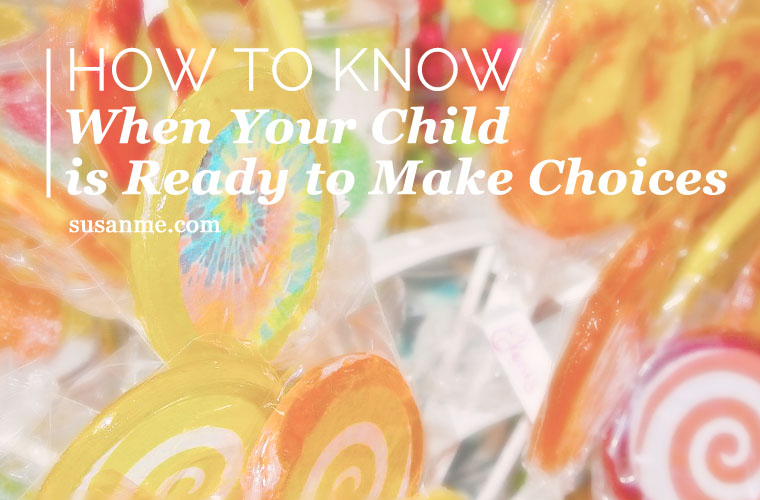In her book The Passionate Mom, my wife, Susan shares her experiences and insight into the joys, struggles, and lessons of motherhood. Today, I’d like to share with you an excerpt from her book that addresses how to know when your child or teenager is ready to make choices.
Every child must learn to make wise choices on the path to adulthood. Little children make little choices and are rewarded by being given bigger choices. The problem arises when little children are given the opportunity to make big choices or lots of choices—or worse, they contest a choice their mothers have already made—difficulties may arise. Here’s an example:
MOM: Honey, we’re going to the zoo, so please put your sneakers on.
CHILD: I don’t want to wear my sneakers. I want to wear my sparkle shoes.
MOM: But we’ll be walking a lot, and your tennis shoes are comfy.
CHILD: So are my sparkle shoes.
MOM: I don’t think they are . . . and we need to go.
CHILD: But, Mommy!
MOM: Okay, okay. If you think you will be okay, wear them.Two things could happen here. On the one hand, the child may end up with blisters and learn a lesson—that would be a good thing. On the other hand, the child may not have blisters, and her desire to challenge her mother’s choices has been reinforced. Either way, Mom should never have opened the choice gate and allowed her child to override the decision she had already made. Here’s another example:
MOM: Honey, would you like to ask Carter to come over and play?
CHILD: I want to have Ben over.
MOM: But the last couple of times you’ve played with Ben, things got out of control. And you got in trouble together at school.
CHILD: You just don’t like Ben.
MOM: Of course I like Ben. I just thought it would be nice to have Carter over . . . but you can ask Ben, if you promise to behave.Same situation. Both of these mothers knew what was best for their child. They just didn’t assert their wisdom. In the first example, the mom felt time pressure. She didn’t want to battle in the interest of time. In the second example, the child was a little older, and knowing his mom well, he made her feel guilty by insisting that she didn’t like Ben.
When a mom concedes, she is sending a message that may lead her child to believe that Mom doesn’t really know what she is doing because she doubts herself and gives in. The child, in comparison, feels so strong that he becomes convinced that he knows what is best for himself.
When children are very young, choice concessions such as these can be harmless, but fast-forward ten years. These children have grown up believing that it is always their right to choose what’s best for themselves—what they wear or whom they play with—and that their mother doesn’t really know what is best or she wouldn’t back down so easily.
Let’s say the girl, now a teenager, comes downstairs to go out, dressed in a skirt twelve inches above her knees and a top made of six inches of fabric. Her father takes one look and tells her to go put some clothes on. Her mom suggests a different top, and the teenager indignantly retorts, “Since when do you tell me what to wear?” She then drives off with a boy that neither parent has ever met, without bothering to say where she is going or what time she will be home.
Innocent choices for toddlers can mean trouble for teenagers. Those choices include every who, what, where, and when of their day—for example: who they play with, what they wear or eat, what they watch on TV, what games they play, where they go and with whom, when they wake, play, work, sleep—until they consistently demonstrate to you that they have wisdom to make the choice themselves. Most kids will have areas where they are really wise and make good choices, and other areas where they don’t. My daughter, for example, had great discernment in friends very early on. However, she was easily enamored with fashion, and it took time for her to develop the ability to say no to styles that were inappropriate. I was off the hook early as the friend gatekeeper but on duty as the “what not to wear” gatekeeper.
I hope this doesn’t sound controlling. In fact, it is quite the opposite. The goal is to slowly open each gate until you no longer have to guard it at all by the time your children graduate high school. They earn the right to choose by demonstrating the ability to choose wisely. Your gatekeeper job should diminish the older they get.
In what areas are your children ready to make their own decisions, and in what areas do you need to keep the gate closed? Feel free to share your story in a comment below.



